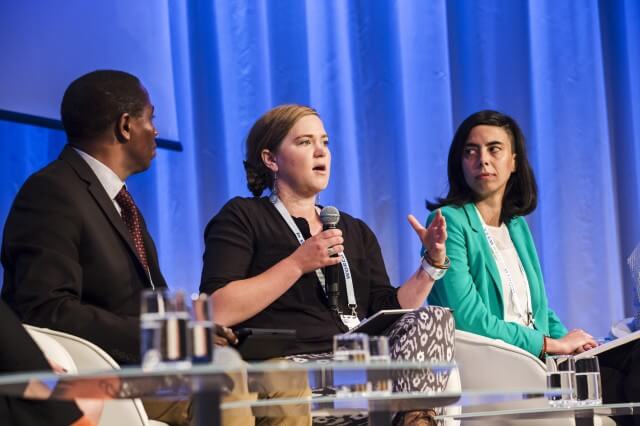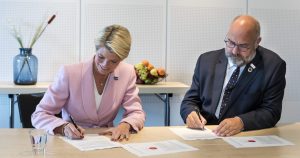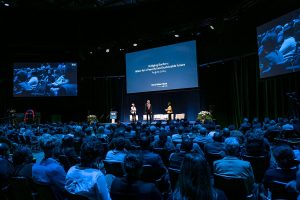SDG takes centre stage at the World Water Week in Stockholm
Swedish Water House recruits and support junior rapporteurs to report from the annual World Water Week in Stockholm. Applications from Sweden based students or young professionals are prioritized.(blog by Isla Duporge)
This was the second year I acted as a rapporteur for the World Water Week, monitoring and analysing the conference discussions to find the new key takeaways from the conversations, published in the overarching conclusions and presented by our team at the closing plenary. There are three rapporteur teams with a different focus; social, economic and environmental. Last year I was in the economic team focusing on aspects of ‘water for development’ and I was surprised at the lack of challenging business as usual practices, this year I was presently surprised with the direction of the conversations. The 17 UN Sustainable Development Goals were central in the discussions and the overriding message was that production must increase to meet the need for food, water and sanitation for the rising population. However, it was widely acknowledged that this must be done in a way that minimises the impact on our water resources, causes minimal waste and prevents us from further degradation of the environment. Rather than green washing and continuing business as usual practices, it was clear that some of the large business players represented were genuinely trying to forge a new way forward.
Similar problems were raised from the previous year with calls for continued work on these issues e.g. the difficulty in accurately pricing water, the high levels of waste water discharge, the need for cross-sectorial collaboration and the need for increased investment in WASH at the local level. The water-food–energy nexus resounded in policy discussions this year and the need to break down the silos between industries to see how heavily each industry relies on the other. The key environmental message that came across strongly to our rapporteur team was the need for investment in systems and technologies that make it easier and cheaper to re-use and recycle wastewater, this focus is highlighted in the theme of the next conference in 2017 on “’Water and Wastewater”.
UNEP has reported that approximately 90% of all wastewater in developing countries is discharged untreated, with polluted water causes more human deaths annually than all forms of violence combined. Considering the growing world population and future need for water, recycling and reusing water is the only way forward. The presentation by Singapore’s Public Utilities Board was inspiring, terming it NEWater rather the wastewater, the city uses advanced membrane technologies and ultra-violet disinfection to allow water to be reused time and again. The country aims to have 55% of Singapore’s water demand met with recycled water by 2060. We need more Singapore’s, where there is a government led initiative to invest in innovative water technologies and these efforts are then fully supported by the private sector. While the challenges in the water sector are still large, they are not insurmountable and the number of dedicated people working in the field who were present during this year’s water week makes me hopeful.








